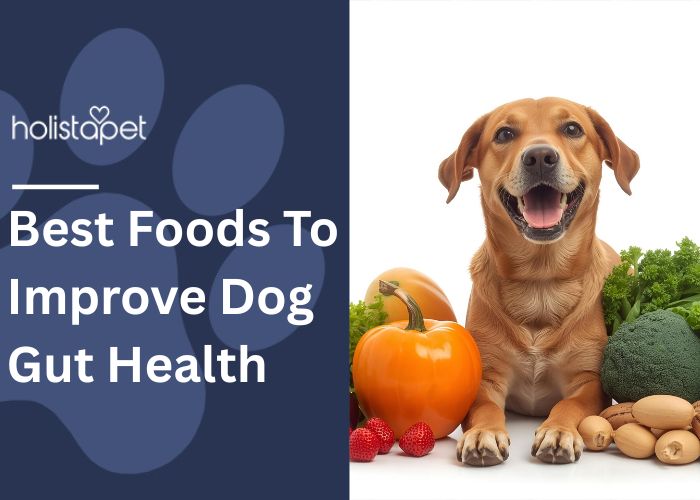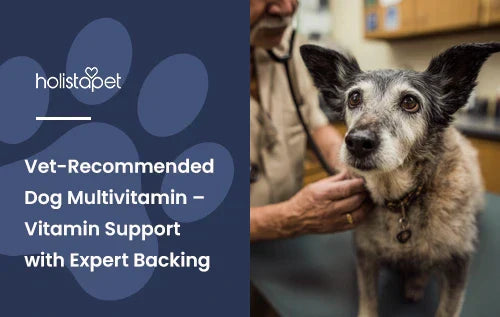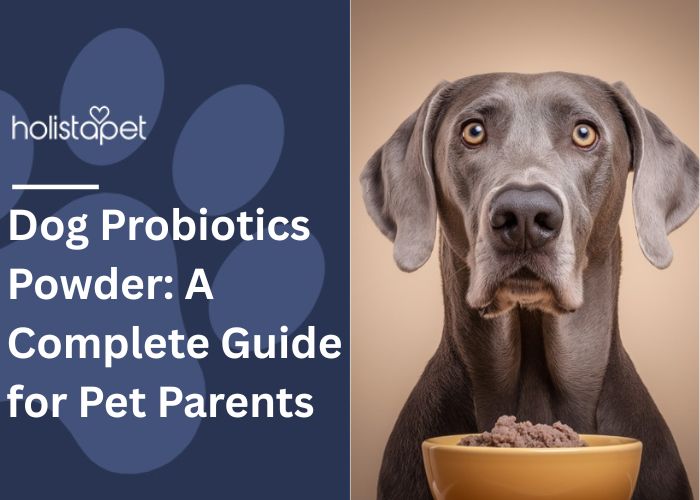Foods to improve dog gut health don't have to be fancy or hard to find. They can be simple, tasty, and already in your kitchen.
Every bite your dog eats shapes their gut microbiome, influencing digestion and immunity. By focusing on real, nutrient-packed foods, you give your pup's tummy the support it needs to stay balanced. A strong gut equals fewer digestive troubles and more playful, happy moments with your best friend.
Why Gut Health Is Essential for Dogs

Your dog's gut health affects not just their digestion but their whole body. A balanced gut microbiome helps absorb nutrients, keeping energy levels steady and your pet active. Good bacteria also keep harmful bacteria in check, protecting the digestive tract. Strong gut health boosts immunity too, giving your buddy better defenses against everyday issues. Simply put, a healthy gut lays the foundation for a happier, healthier life.
Signs Your Dog May Have Poor Gut Health
The state of your dog's gut health can show up in many ways. If something in their belly feels off, you'll notice some changes like:
-
Digestive Upset. Gas, diarrhea, or constipation can signal trouble in your dog's gastrointestinal tract.
-
Skin Irritations and Allergies. Rashes, itching, or frequent breakouts may connect to an imbalance in your dog's gut bacteria.
-
Low Energy and Mood Shifts. A sluggish attitude or mood changes often tie back to poor digestion.
What Types of Foods Are Good for Dogs' Gut Health?

The best diet for your pup's belly supports digestion, boosts beneficial gut bacteria, and maintains a healthy microbiome. Fresh, wholesome choices help them feel better and stay active. At the same time, dog owners need to avoid food items like grapes, raisins, onions, garlic, and certain fruit seeds or skins, as these can upset the canine stomach.
Lean Proteins for Digestive Strength
Lean proteins give your pup's digestive system the strength it needs without adding extra fat. Chicken, turkey, and fish are excellent choices that provide amino acids to support muscle health and energy. These proteins are easier on the stomach compared to fatty meats.
Always serve them cooked and plain, without seasoning or sauces. Avoid processed meats like deli slices or sausage, which can upset digestion and introduce harmful additives into your pet's diet.
Vegetables That Support Fiber Balance
Vegetables rich in fiber help keep your dog's digestion running smoothly. Leafy greens, zucchini, and green beans can add fiber that supports a balanced gut microbiome. Fiber also helps regulate bowel movements, reducing digestive issues like constipation.
Stick to dog-safe veggies and cook them lightly for easier digestion. Skip onions, garlic, and mushrooms, since these can be very harmful to canines.
Fruits That Add Natural Prebiotics
Certain fruits feed the good bacteria in your dog's gut, helping build a healthy gut microbiome. Apples (without seeds), bananas, and blueberries contain natural prebiotics that support digestion and immunity. These fruits also provide additional nutrients like vitamins and antioxidants.
Keep servings small, since too much fruit can upset your dog's stomach. Always remove seeds, pits, and skins that might cause digestive problems later on.
Whole Grains for Steady Digestion
Whole grains can provide lasting energy while supporting your dog's microbiome. Brown rice, oats, and barley provide dietary fiber that helps regulate the digestive tract. These grains also aid nutrient absorption and keep your pooch feeling satisfied between meals.
Introduce grains slowly, since some pups have sensitive stomachs. Keep in mind your pet's food sensitivities and avoid refined grains or anything with added sugars.
Fermented Foods for Microbiome Support
Fermented foods add live microorganisms that can help strengthen your dog's gut microbiome. Options like plain yogurt or kefir provide beneficial bacteria that support healthy digestion. These options may also help balance good and bad bacteria in the stomach.
Always choose plain versions without artificial sugars, which can be harmful to dogs. Start with small amounts to see how your pup responds first. You can also talk to your veterinarian for further guidance.
Supportive Foods for Dog Gut Health

Some foods go beyond basic nutrition and provide extra support for your dog's digestive health. These options help maintain a balanced gut microbiome and give your pup the boost they need. Pumpkin, sweet potatoes, blueberries, and carrots are all gut-friendly choices that work alongside lean proteins and vegetables. Each one offers unique benefits that keep your dog's gut in great shape.
Pumpkin for Smooth Digestion
Pumpkin is one of the simplest choices for better digestion. Its natural fiber helps regulate the digestive tract, keeping things steady, whether your dog's poop tends toward constipation or diarrhea. Pumpkin also supports nutrient absorption, which is crucial to gut health.
Choose plain, canned pumpkin with no added sugar or spices, or cook fresh pumpkin at home. A spoonful mixed into your dog's food can promote smooth, regular digestion.
Sweet Potatoes for Fiber and Energy
Sweet potatoes give your pup a gentle source of fiber that supports digestive balance. They also provide complex carbs, which offer steady energy without upsetting the stomach. This makes them a smart addition for canines with sensitive digestion.
Bake or steam sweet potatoes and serve them plain, without butter, salt, or seasoning. Their natural sweetness keeps meals tasty while delivering fiber and other nutrients that encourage a healthier gut.
Blueberries for Antioxidant Protection
Blueberries are tiny but packed with natural antioxidants that protect cells and support immune health. Their fiber content also helps keep the gut balanced.
Serve blueberries fresh or frozen as a snack or mix a few into meals. Keep portions small to avoid stomach troubles. With their sweet taste and nutrient boost, blueberries make a simple way to support your dog's health beyond just their belly.
Carrots as Crunchy Prebiotics
Carrots add a natural crunch and serve as a gentle prebiotic for your dog's gut. The fiber in carrots helps feed beneficial bacteria, keeping the digestive tract balanced. They're also rich in vitamins that support overall health.
Offer carrots raw as a snack or lightly steamed for easier chewing. Skip seasonings or dips, since plain carrots are best. With their crisp texture and gut-friendly fiber, carrots make a healthy, low-calorie treat.
Additional Natural Options
Some other natural additions can boost your dog's gut health even further. These options work alongside a balanced diet to encourage healthy digestion and overall wellness.
-
Probiotics for Dogs. Probiotics introduce beneficial bacteria into the gut, helping restore balance. HolistaPet's Probiotic Chews are a tasty way to add live bacteria. Each soft chew contains a blend of 9 strains, sweet potato, and pumpkin to support digestive regularity, soothe skin irritation, and improve overall well-being.
-
Prebiotic Supplements. Prebiotics feed good bacteria already living in your dog's gut, enhancing their effect.
-
Herbal Helpers. Chamomile, licorice root, and similar herbs can calm the digestive tract and support gut balance naturally.
View All Holistapet Supplements for Dogs Here.
Feeding Guidelines for Gut-Friendly Nutrition
Feeding the right foods is only part of the bigger picture. How you serve them matters, too. Keeping meals balanced and portions steady helps protect your pup's gut.
-
Suggested Portion Sizes. Adjust portions based on your dog's size, age, and activity level. Too much food at once can strain the tummy. Smaller, consistent meals keep the gut on track.
-
Safe Ways To Introduce New Foods. Add new options gradually, mixing small amounts into your dog's regular diet. This gentle approach lets the stomach adapt without causing upset.
FAQs – Food Items To Improve Dog Gut Health
These quick answers cover topics like probiotics, grains, timing of results, and combining supplements. With the right guidance, you'll feel confident about supporting your dog's digestion every day.
Can dogs eat yogurt for probiotics?
Yes, dogs can eat plain, unsweetened yogurt as a source of live bacteria. Yogurt may add beneficial microorganisms to your dog's digestive system, helping balance good and bad bacteria. It also provides protein and calcium that contribute to overall health.
Always pick yogurt without artificial sweeteners, especially xylitol, which is harmful to dogs. Start with small portions to check tolerance.
Are grains safe for improving dog gut health?
Yes, grains like brown rice, oats, and barley can support your dog's gut health. These whole grains provide fiber that keeps the digestive tract steady and helps with nutrient absorption. They also offer lasting energy, which keeps your pup active and satisfied.
Not every canine digests grains the same way, though, so introduce them slowly. Avoid processed grains and anything with added sugars. When chosen carefully, whole grains can be a safe, gut-friendly part of your dog's diet.
How soon will gut health improve after changing foods?
Some improvements in your dog's gut health can start to show up within a few days, but bigger changes may take weeks. As beneficial bacteria grow and balance out the gut, signs like better stools, more energy, and less stomach upset become clear.
Remember, every dog is different. The timeline depends on their diet, age, and overall health. Stay consistent with gut-friendly meals, and your pup's digestive system will gradually feel stronger and more balanced.
Should probiotics be combined with gut-friendly foods?
Yes, probiotics work best when paired with gut-friendly foods that feed beneficial bacteria. Together, they support a balanced gut microbiome, improve digestion, and strengthen your dog's immune system. Probiotic supplements add live bacteria, while foods rich in fiber and nutrients help those bacteria thrive.
HolistaPet Probiotic Chews make it easy to combine both benefits. With 9 strains of good bacteria plus pumpkin and sweet potato, these chews support digestion, soothe skin issues, and boost overall wellness.
Final Thoughts on Food Options To Improve Dog Gut Health
Supporting your dog's gut health starts with the right foods in their bowl. Fresh proteins, veggies, fruits, and grains—all these work together to keep the digestive system balanced. Adding in supportive options like probiotics can make the benefits even stronger.
HolistaPet makes this easier with probiotic chews designed to promote healthy digestion and immune health. With tasty, natural ingredients, they give your pup a boost toward better gut health and overall happiness.
Click the link to view more Dog Nutrition tips!



 CBD Oil for Dogs - Fast Acting
CBD Oil for Dogs - Fast Acting
 Chicken Flavored CBD Oil For Dogs - Easy Dose
Chicken Flavored CBD Oil For Dogs - Easy Dose
 Salmon Flavored CBD Oil For Dogs - Highly Rated
Salmon Flavored CBD Oil For Dogs - Highly Rated
 CBG Oil for Dogs and Cats - Loved by Thousands
CBG Oil for Dogs and Cats - Loved by Thousands





Leave a comment
All comments are moderated before being published.
This site is protected by hCaptcha and the hCaptcha Privacy Policy and Terms of Service apply.